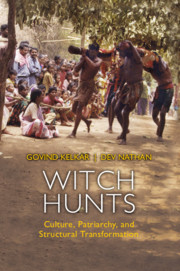4 - Factors in Witch Hunts
Published online by Cambridge University Press: 12 May 2020
Summary
In this chapter, we give some examples from our case studies to illustrate the different factors leading to witch accusations and persecutions. The factors identified in the witch hunts are the following: seizing land and other property from women; jealousy; asking for dues; assertion of independence and initiative by women; resisting sexual predation; unconventional religious practices; and causing illness and misfortune. Causing illness or misfortune is a common factor in all accusations. However, there are some cases where discussion did not disclose any other factor, and such cases have been included in the category of the main charges against a woman, which were seen as the determining factor for her being labelled a witch.
In our discussions with the survivors, there was a readiness on their part to discuss these above-listed factors. Since the survivors knew that they were not witches, in the sense of having and using supernatural powers, even if they too believed in the existence of witches, they were very keen to look to these other factors that they think might have led to the witch accusations. Of course, if you do not ask the question, you will not get an answer.
In discussing these factors, other than the belief in harm caused by alleged witches, there is an element of reflexivity involved in the process. There, however, was an attempt to reduce this by discussing the case and then noting where it fitted in the categories of other factors, whether jealousy or so on. It is not as though the survivors were provided with a list and asked to choose from among the factors listed. After discussions with the concerned woman or man, we analysed a case and marked it as belonging to one or another category or belonging to more than one category. In fact, even this list of categories was derived from a day-long discussion with 13 survivors. The authors did not have the category of different religious practices as a factor in witch accusations. This came out of that day's discussion, when it was mentioned by one of the women alleged to be a witch.
- Type
- Chapter
- Information
- Witch HuntsCulture, Patriarchy and Structural Transformation, pp. 71 - 86Publisher: Cambridge University PressPrint publication year: 2020
- 1
- Cited by



